Research
Mak-RIF Round 5, Track 2: PhD Research Grants 2023/2024 Request For Applications
Published
2 years agoon
By
Mak Editor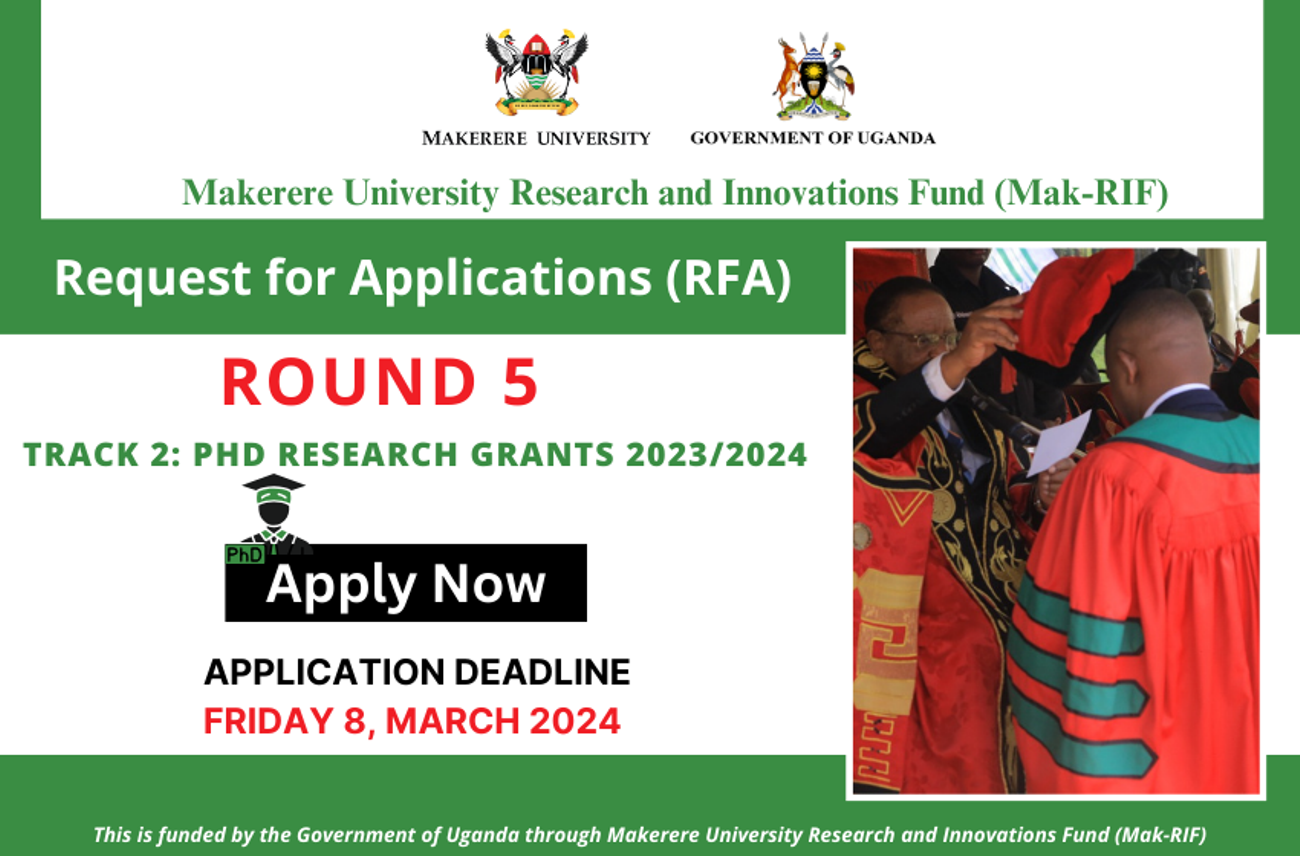
Background
Funding opportunity description: Makerere University received special funding from the Government of the Republic of Uganda, to support high impact Research and Innovations that will accelerate national development. The Financial Year 2022/24 is the fifth year of this fund’s availability. The fund illustrates the increasing importance that the Government attaches to Research and Innovation as a driver of socio-economic transformation. The objective of the fund is to increase the local generation of translatable research and scalable innovations that address key gaps required to drive Uganda’s development agenda. Over the last four Financial Years (2019/2020 – 2022/2023), government appropriated 105 Billion Uganda Shillings to support this Fund. Between the four years, MakRIF has funded a total of 1.062 projects across all sectors critical for development. In the current Financial Year (2023/24), Makerere University expects to receive about 30 Billion Uganda shillings (about US$ 8.1 million) under the Government Research and Innovation Fund (RIF). Of this, at least 1.5 Billion Shillings will fund PhD research ideas that generate knowledge that addresses national development priorities. The Makerere University Research and Innovation Grants Management Committee (GMC) therefore announces the second round of PhD research grants as part of the 5th round of RIF funding titled: RIF Round 5, Track 2 (PhD Research Grants). Available funds are obligated for the Financial Year 2023/2024, with an expectation of actionable results that speak to the National Research and Innovation Agenda. The GMC therefore invites applications from PhD students with original research ideas that demonstrate a clear link to key thematic areas of the National Research and Innovation Agenda. This is a closed call that is open to only PhD students. This funding call is specifically targeted to PhD students that are full time at Makerere University.
Grant amounts and estimated number of awards: The GMC estimates to award the following number and amount of PhD Research Grants:
| Category | Amount per award | Approx. No.* | Total amount |
| A. Awards to new projects | |||
| Sub-Category 1: Arts and Humanities | Up to 25,000,000/= | 25 | 625,000,000/= |
| Sub-Category 2: Sciences | Up to 35,000,000/= | 25 | 875,000,000/= |
| Sub-total | 50 | 1,500,000.000/= | |
| B. Extension awards to projects funded before | |||
| Sub-Category 1: Arts and Humanities | Up to 25,000,000/= | 25 | 625,000,000/= |
| Sub-Category 2: Sciences | Up to 35,000,000/= | 25 | 875,000,000/= |
| Sub-total | 50 | 1,500,000.000/= | |
| Total | 100 | 3,000,000,000/= |
*Note: The numbers shown are only indicative. The MakRIF GMC reserves the right to adjust the numbers based on the quality of the proposals submitted.
Applicants should take into consideration the following:
- Given that the MakRIF funds are received on an annual basis and are tied to a specific financial year, the current grant only commits to funding the awardee for a period of one year (12 months) of implementation.
- However, the MakRIF GMC is cognizant of the fact that PhD research often spreads over more than one year in which case some projects require multi-year funding. Because of this reality, half of the awards under this round will fund extensions for eligible projects that were previously funded. Extension funding will not be automatic but will be competitive and conditional to the following: 1) Availability of funds, 2) Showing cause as to which additional areas of research will be covered in the extension funding, 3) Successful execution and completion of all the objectives for the previous funding period, evidenced by full submission of the required deliverables; 4) Full technical and financial accountability for all the funds given to the researcher during the previous year of funding. Prior grantees in need of extension funding must apply for the follow-on funding through the new PhD Research Grant call.
- The GMC recognizes that the amounts indicated for this award may not be sufficient to cover all the necessary costs for a student’s project. In such cases, the award should be considered as a contribution and the students should mobilize additional funding to bridge the resource gaps.
- The number of awards indicated are only estimated and the GMC retains the discretion to determine the amount and number of awards based on the actual funding that MakRIF funders will make available and the number of quality proposals submitted.
Scope and Technical Description of the Research and Innovation Grant
The GMC conducted a comprehensive stakeholder consultation to identify priority thematic areas of interest for national development. The GMC triangulated this information with that from the National Development Plan III, the Makerere University Strategic Plan and Research Agenda to develop an instructive MakRIF research agenda that responds to national development priorities. The RIF Round 5, Track 2 (PhD Research Grants) will therefore specifically target research and innovation projects that align with priority thematic issues in the MakRIF instructive Research Agenda under 14 thematic areas as follows:
Theme 1: Transforming the Agricultural sector to drive development
Theme 2: Achieving Sustainable health as a means to sustainable development
Theme 3: Re-imagining Education to unlock capacity for economic development
Theme 4: Water, sanitation and the environment: A pre-requisite to sustainable development
Theme 5: Harnessing the social sector, culture and arts to drive development
Theme 6. Harnessing Tourism, wildlife and heritage for development
Theme 7: Sustainable Planning, finance and monitoring as catalysts for growth
Theme 8: Leveraging public service and local administration for efficient service delivery
Theme 9: Defence and security: Achieving sustainable peace and stability
Theme 10: Strengthening law, governance, human rights and international cooperation as prerequisites for development
Theme 11: Harnessing Information and Communication Technology to drive development
Theme 12: Works, manufacturing, science and technology as tools to accelerate development
Theme 13: Solutions to catalyse business and enterprise
Theme 14: Energy and Minerals as drivers of rapid economic development
The MakRIF PhD Research Grants will cover all technical disciplines in Makerere University as long as the research questions align with the instructive research agenda themes above. Particular attention will be paid to ideas that have clear potential for scalability to drive development.
Note: This grant covers the costs of research. It does not cover payment of tuition or living stipends for PhD students.
Eligibility
The new PhD research grants will only be open to PhD students who have been approved for full registration at Makerere University. Students who have already received full scholarships under other award programs are not eligible to apply for these grants as this will constitute double funding. Members of Academic staff who are not on the Makerere University Staff Development Program, as well as those who are on the Staff Development Program but received only a tuition waiver without research funding are eligible to apply, provided they do not have full funding for their research from elsewhere. This funding is only open to Makerere University students. PhD students registered in other universities are not eligible for this funding. Further specifications on the awards are as follows:
- Applicants for new awards must be at a stage where they have been approved for full registration as PhD students at Makerere University. Being at the stage of full registration means that they have developed a full research proposal that has been approved by the respective Higher Degrees Research Committee in their academic unit, and that they have been recommended for full registration OR are fully registered by Makerere University. New grant applicants will be required to provide evidence of one of the following: Minutes of the Higher Degrees Research Committee in their Academic college, showing approval of their research proposal, OR a full registration certificate.
- Because the research funds are provided for one year funding cycles, PhD students with provisional registration will not be eligible for funding under this award since the time required for them to complete full proposal development and to start data collection is unlikely to fit within the financial year.
- New grants are limited to PhD students who do not have prior funding for their studies or whose funding is inadequate to cover their research. Applicants in the latter category must make full disclosure of their other funding sources and what they cover.
- Applicants for extension awards should have been funded in the earlier PhD research awards. Only those who have completed and closed out their previous projects will be considered.
- All applicants (new and extension) should provide a letter of support from any one of the following: 1) The Head of their Department, or 2) The Dean of their School, or 3) the Principal of their College (Only one of these is sufficient).
- All applicants (new and extension) should provide a letter of support from one of their Supervisors within Makerere University. The letter should clearly indicate that they do not have other funding that fully covers their research/training activities, or where such funding is available, they should indicate what aspects of the student’s study program it covers and the funding gap. The supporting Supervisor will be designated as a co-Investigator on the research project.
GRANT GUIDELINES
MakRIF PhD Research Grant applicants will submit a competitive project proposal for the available funding. The proposal ought to specify the objectives for the full research project. It should also indicate which of the full research objectives will be specifically met by the available funding for this financial year.
Applicants intending to apply for multi-year funding in the subsequent years will be required to indicate so. In such cases, the students should indicate which study objectives would be covered by the extension funding.
The research problem: The proposal should clearly articulate the knowledge gap that the researcher targets to address, and why it is important to address this knowledge gap. The research problem should be aligned to at least one theme in the MakRIF research agenda.
Previously funded proposals applying for extension funding should indicate how the proposed research problem builds on the research problem of the previous phase.
The proposed solution: PhD Researchers should present the proposed solution in form of the research focus for the current phase of the funding. They should clearly articulate the objectives of the planned research. Researchers should also describe the critical content of the solution (i.e., the ‘research methodology’). Researchers should defend the relevance of the proposed solution to addressing key development outcomes in the respective sector and its alignment to one or more thematic areas specified in this call. Researchers should also demonstrate that at least one objective of their research project is implementable within one (1) year and will result in tangible results within one year of execution.
Research projects that require multi-year implementation will only be considered if they can show actionable intermediate results or objectives attainable within 1 implementation year, since funding will be on a yearly basis. Apart from a summary of the proposed approach, researchers will provide a more detailed description of their technical approach (research methodology) to enable a robust assessment of the rigor of the proposed methodology.
Previously funded proposals applying for extension funding should indicate how the proposed solution builds on the solution from the previous phase.
Outputs, outcomes, and impact: Researchers should articulate the overall scientific outputs, outcomes and anticipated impact of the PhD research project. They should state the primary (Direct) and secondary (Indirect) beneficiaries of the planned research project. They should state the anticipated outputs (the outputs of the activities of the entire project as well as the specific milestones to be attained with the one-year funding) and the outcomes (both the outcomes of the entire project and those for the current funding phase). Researchers should also state the anticipated impact of the the project (Note: Impact might not be achievable in one or even a few years in which case the current phase only contributes to it). Since this funding is specific to the current financial year, projects must demonstrate clearly the deliverables they expect within one year, matching the level of investment made and attainable in the 1-year timeframe. Multi-year projects should show clearly what will be achieved in the current year of funding as well as what would be achieved overall when the full PhD research is completed in the subsequent years.
Previously funded proposals applying for extension funding should indicate how the proposed outputs, outcomes and impacts build on those realized in the previous phase of funding.
Translation and dissemination for impact: Since this fund is aimed at supporting government and its partners to improve service delivery and to accelerate development, researchers should show a clear plan for disseminating their findings to audiences critical for policy and program change so as to achieve impact at scale. This will include a clear description of the knowledge translation and dissemination plan to stakeholders in the relevant sectors including the knowledge products anticipated to arise from the study (e.g., publications, policy briefs, knowledge briefs, etc.). Innovation-based projects should articulate a scaling strategy, including linkage to scaling partners within the industry (for commercially viable enterprises), or within the relevant public sectors (for innovations targeted to the public) or within relevant implementing agencies (for social enterprises). Innovations targeting commercial interest should demonstrate the anticipated commercial potential, anticipated demand, anticipated patents/copy-rights/industrial design claims/trademarks if applicable and the path to commercialization. Innovations targeting social impact (social innovations) should elucidate the path to wide scale community uptake.
Previously funded proposals applying for extension funding should indicate how the planned knowledge translation/scaling activities builds on those in the previous phase of funding.
Ethical implications: The implications of the research to human subjects, animal subjects and the environment should be articulated where necessary including how key ethical or environmental concerns arising from the study will be addressed. It is anticipated that at the time of full registration, projects requiring ethical approval will have already obtained that approval from their respective ethics committees.
Budget: Researchers will prepare a summary budget for the one-year phase of their project as well as a detailed budget. Budgets should be submitted in the official currency (Uganda Shillings). Because these are university funds, academic units (Departments, Schools and Colleges) will not charge institutional overheads to any of the research funds. Budgets should not spread beyond one Financial Year. Even if the projects to be funded under this mechanism are multi-year, researchers should provide a budget for only one Financial Year. The budgets will include the following sections:
- Personnel costs
- Travel
- Supplies and services
- Equipment
- Program activity costs
- Dissemination
Under Personnel costs, applicants should not budget for ‘Salaries’ for staff who are paid a salary by Makerere University or another Government of Uganda institution (whether on permanent or contract terms) as this would constitute double payment from government funds. However, such researchers can budget for ‘activity-based’ time input or ‘level-of-effort-based’ costs for their additional time input into the project in form of allowances. The latter should be justified by specifying the extra-time demands from the project for each individual involved.
Researchers can budget for salaries for critical project staff that are not paid by Makerere or the Government of Uganda e.g., Project Coordinators, Administrative Assistants, Research Officers etc. Regular Personnel costs excluding field research assistants should not exceed 33% of the budget. Field research assistants (or Data collectors) if needed should not be included under ‘Personnel costs’ but should instead be included under ‘Program Activity Costs’. All salaries and all repetitive allowances will be subject to mandatory statutory deductions at source, to pay the relevant taxes. Because these funds are earmarked to support actual research, PhD students cannot budget for a monthly stipend under this award.
In addition to the summary budget, research teams will be required to attach a detailed budget (As an MS Excel attachment) that breaks down all expenditure line items, inclusive of a budget justification that explains the rationale behind the different budget items. The total budget in the budget summary should exactly match that in the detailed breakdown. You should budget within the category that your project was funded in RIF-1. Budgeting in another category will lead to disqualification. The total budget should not exceed the highest amount indicated for the respective funding category in which your project lies. Exceeding the indicated category maximum can result in disqualification.
PhD Researchers cannot budget for Tuition.
Workplan: Researchers will provide a list of key milestones for the project clearly demonstrating the deliverables expected at each point during the extension phase of the project. These milestones will be used as the basis for tracking implementation of activities towards project goals and outputs. Given the one-year time-frame for the awards, it will be important that researchers commit to a clear time-bound set of deliverables all achievable within one year for the main deliverable targeted during the current period of funding. Failure to articulate a one (1) year plan will imply inability to utilize the grant funds within one (1) year.
Previously funded proposals applying for extension funding should indicate how the current workplan/milestones build on those proposed and realized in the previous phase of funding.
GRANT PROCESS
Submission of applications: Submission of the applications will be online at https://rif.mak.ac.ug/portal. All submissions must be online and must be made within the stipulated period. To access the application form, the PhD Research Fund applicant will be required to create a MakRIF account. In your account, select the appropriate funding opportunity and fill out the application form.
Rules governing applications: All applications should be written in English. All applications should be submitted via the online portal mentioned above. Complete applications must be submitted not later than 11.59pm East African Time on the closing date. No submissions after closure of applications will be accepted. Any attempt at solicitation of acceptance beyond this date will not be entertained. The Grants Committee bears no responsibility for submissions that are not completed in time and incomplete submissions will not be considered. If none of the submitted applications meets the requirements to receive a grant, the call may be reopened at the sole discretion of the Grants Management Committee. An individual researcher should not submit more than ONE application.
Participants agree to assume any and all risks, and to waive claims against Makerere University and the Grants Management Committee for any injury, death, damage, or loss of property, revenue, or profits, whether direct, indirect, or consequential, arising from their participation in this grant implementation.
Evaluation and selection of projects: Applications will be reviewed by the GMC. Submission of an application does not mean the project must be funded. The GMC will evaluate five main aspects of the project:
- The alignment of the proposed research to national priorities as stipulated in the MakRIF research agenda
- Clear articulation of the knowledge gap and how the planned research will contribute to building new knowledge
- Quality of the proposal in terms of the relevance and innovativeness of the proposed solution, the planned activities and the articulation of a sound methodology
- Clear stipulation of outputs and outcomes and feasibility of tangible achievements within one year of funding
- Potential impact and transformativeness of the proposed research idea, especially in contributing to national development
- Submission of a realistic budget
Notification of successful applicants: Successful applicants will be informed by email to their designated point of contact.
Grant timeline:
| Milestone | Date |
| Issuance of RFA | Friday 9th February 2024 (Closed to PhD students only) |
| Closing date for applications | Friday 8th March 2024 |
| Selection | Monday 11th March 2024 to Friday 12th April 2024 |
| Award notification | Friday 12th April 2024 |
| Induction | Wednesday 17th April 2024 |
You may like
-
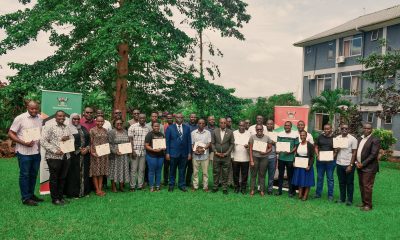

Thirty Public Officers Certified in Integrated Regulatory Cost-Benefit Analysis
-


Botswana Delegation Visits Makerere’s Public Investment Management Centre to Study Sustainable Training Model
-


Makerere University commemorates 13 transformative years of partnership with Mastercard Foundation
-


Mak News Magazine: February 2026
-


Celebrating Academic Excellence: CoBAMS Presents 975 Graduands at Mak 76th Graduation Ceremony
-


Makerere’s 76th Graduation Ceremony: CHS showcases research strength with 26 PhD Graduates
Research
Call for PhD Student Fellowships under H-DATA
Published
4 weeks agoon
February 6, 2026By
Mak Editor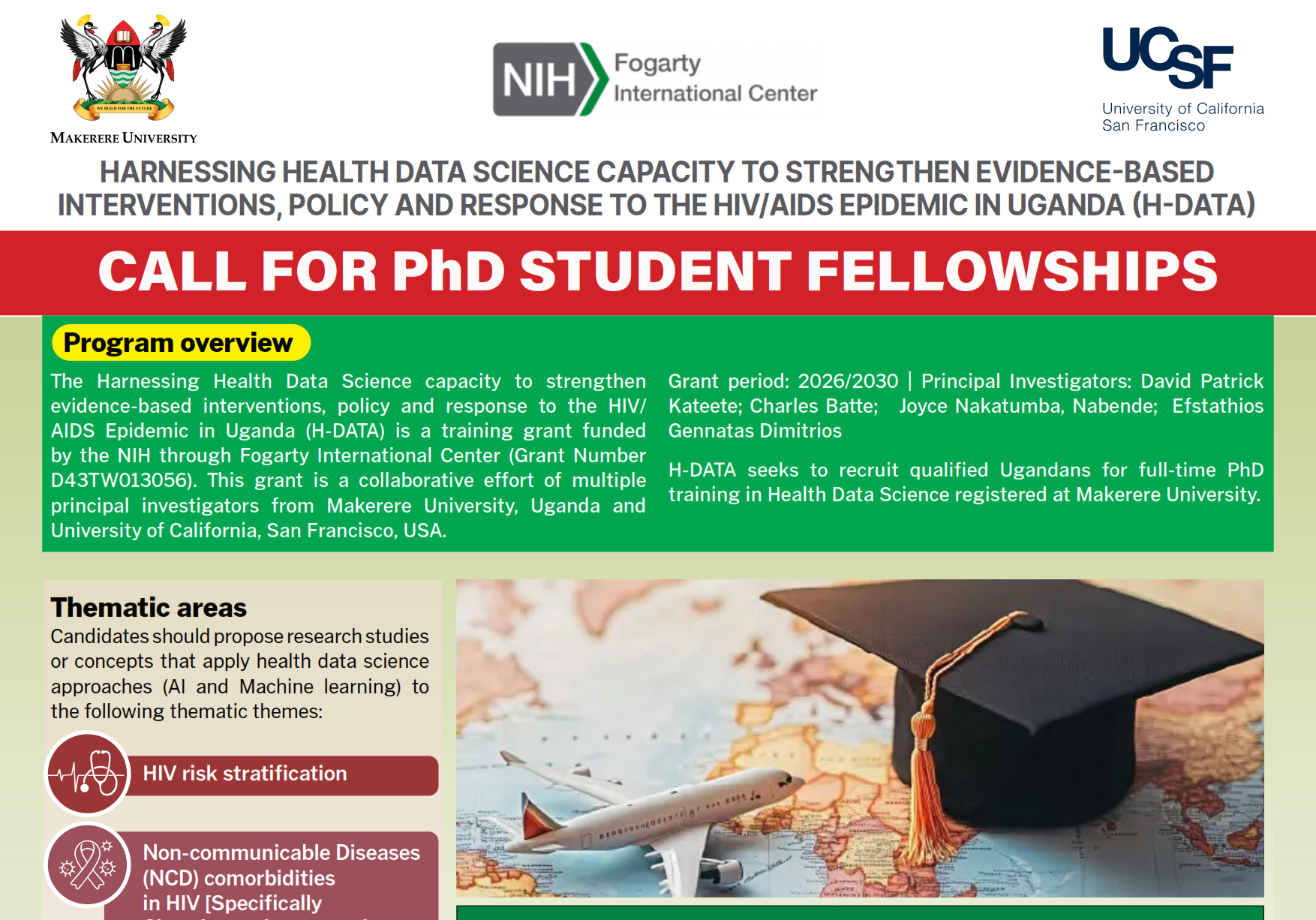
Program overview
The Harnessing Health Data Science capacity to strengthen evidence-based interventions, policy and response to the HIV/AIDS Epidemic in Uganda (H-DATA) is a training grant funded by the NIH through Fogarty International Center (Grant Number D43TW013056). This grant is a collaborative effort of multiple principal investigators from Makerere University, Uganda and University of California, San Francisco, USA.
Grant period: 2026/2030 | Principal Investigators: David Patrick Kateete; Charles Batte; Joyce Nakatumba, Nabende; Efstathios Gennatas Dimitrios
H-DATA seeks to recruit qualified Ugandans for full-time PhD training in Health Data Science registered at Makerere University.
Thematic areas
Candidates should propose research studies or concepts that apply health data science approaches (AI and Machine learning) to the following thematic themes:
- HIV risk stratification
- Non-communicable Diseases (NCD) comorbidities in HIV [Specifically Chronic respiratory and cardiovascular diseases / hypertension]
- HIV treatment outcomes, adherence, and long-term ART trajectories
- Non-Canonical HIV resistance mutations
- Digital medicine and real-world HIV data
- Health systems and policy analytics for HIV programs
Fellowship package
The PhD fellowship support is for up to three (3) years (full-time), subject to annual performance reviews and progress milestones. Successful scholars will be registered at Makerere University and may undertake sponsored didactic health data science methods training at the University of California, San Francisco (UCSF), USA, to receive additional skills development and mentorship in health data science research.
Application Information
| ELIGIBILITY Applicants should meet the following minimum requirements: – Master’s degree in Computer Science, Statistics/Biostatistics, Mathematics, Electrical Engineering, Bioinformatics, Epidemiology, Public Health, or another data-intensive discipline. – Demonstrated interest and/or experience applying data science methods/technologies to health research or health systems. – Strong quantitative or computational skills (e.g., programming, statistical analysis, machine learning, data management). – Ugandan citizenship and commitment to advancing health data science in Africa. – Ability to enroll in and complete full-time PhD training at Makerere University. Note: Additional program- or department-specific admission requirements may apply. Note: Proof of admission is not required at the time of application. However, preference will be given to applicants who have already secured admission to, or are currently registered in, a relevant PhD programme. | APPLICATION PACKAGE & SUBMISSION Submit the following documents by email as a single application package: – NIH Biosketch (maximum 4 pages) including relevant publications (if any). – Cover letter (maximum 1 page). – 2-page research concept note highlighting: research problem, specific aims, research design, and analysis plan. – Academic transcripts and certificates for the relevant Master of Science (MSc) degree. – Statement of purpose / motivational letter (maximum 800 words) for undertaking doctoral training in Health Data Science. – Two letters of recommendation with up-to-date contact details from academic referees. Email subject line (recommended): APPLICATION – Doctoral Scholarship – H-DATA PhD File naming convention (recommended): LastName_FirstName_DocumentName (e.g., Batte_Charles_CV.pdf) Application deadline: [February 28th 2026 by 5pm EAT] Program contact: [Dr Charles Batte at the address: hdatatraining@gmail.com] |
Research
International Fellows Recruitment – Wellcome Sanger Institute
Published
2 months agoon
January 8, 2026By
Mak Editor
The Wellcome Sanger Institute is seeking exceptional early career stage scientists to join the Institute as an International Fellow, contributing to the Institute’s scientific portfolio. Up to six fellowships available.
The Institute is an internationally outstanding genomic research centre with over 30 core faculty teams and 1,300 employees based south of Cambridge, UK.
Fellowship Eligibility:
- You are typically an early-mid career group leader/faculty usually up to nine years post PhD, based at a research organisation in a low- or middle-income country (LMIC). You may hold a faculty or equivalent position and are seeking to establish or strengthen your research team to develop an internationally recognised research portfolio. We also welcome applicants with equivalent experience, including those who have taken career breaks or followed non-traditional paths
- Your main research aims should be focused on your local country and research priorities which contributes to or complements the Institute’s scientific strategy through their expertise.
Closing date: 13th February 2026
Research
Makerere University Launches Knowledge-Sharing Platform to Drive Innovation and Economic Growth
Published
2 months agoon
December 19, 2025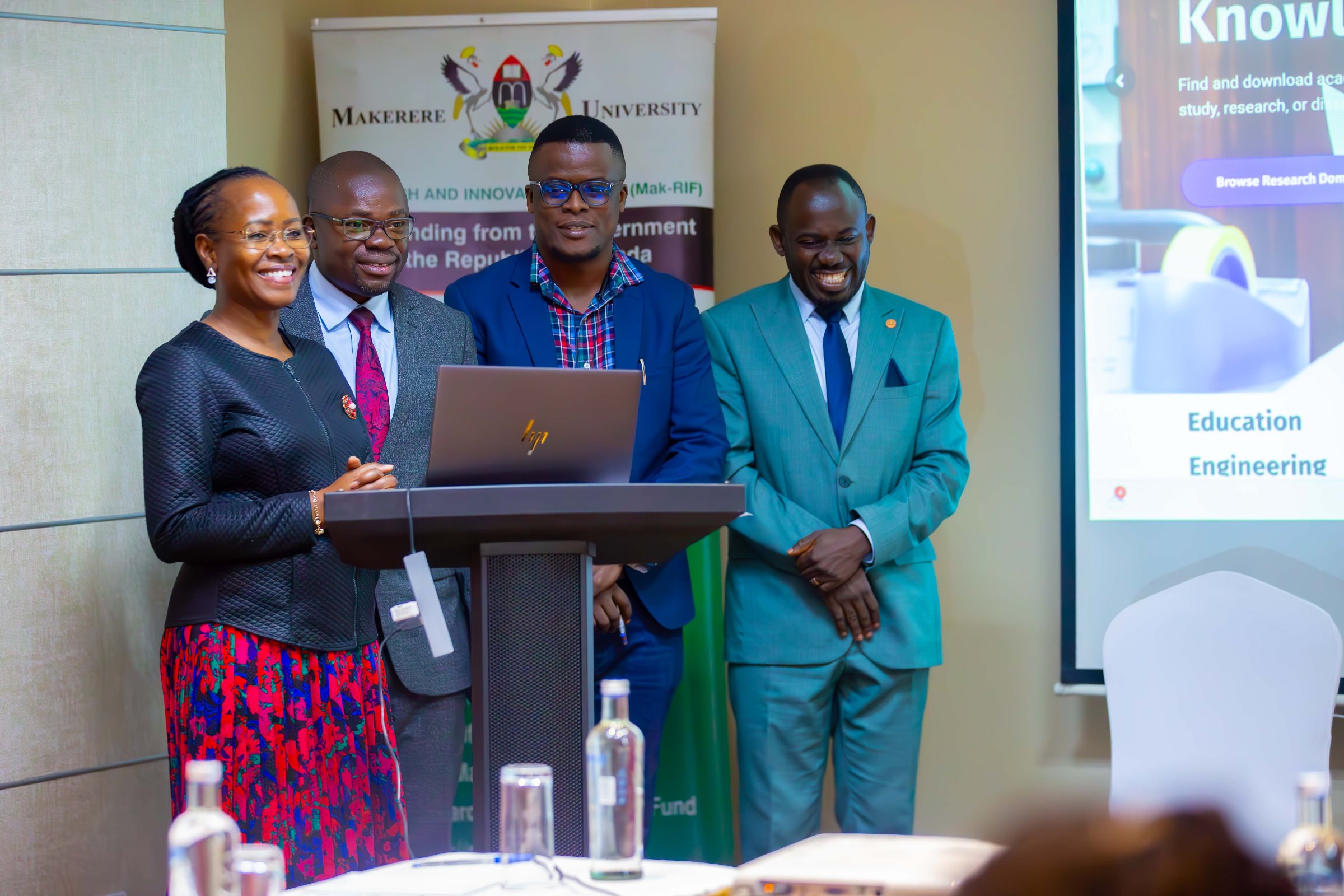
Makerere University has launched a knowledge-sharing platform designed to bridge research, education, and community outreach, with the aim of accelerating innovation and economic development in Uganda.
The platform is the outcome of a project led by Prof. Edward Bbaale, which examined how universities can translate research, innovations, and institutional capabilities into tangible impact for communities, businesses, and national economic growth, in line with the government’s tenfold growth agenda. The project was funded by the Government of Uganda through the Makerere University Research and Innovations Fund (Mak-RIF).
The study also explored how university-based research and innovation can be better aligned with Uganda’s development priorities in agriculture, tourism, mineral-based industrialization, and science and technology, as outlined in the Fourth National Development Plan (NDP IV).
Speaking at the launch, the First Deputy Vice-Chancellor for Academic Affairs, Prof. Sarah Ssali, said the platform would strengthen the link between academic research and societal transformation. She also noted that knowledge production and utilization is a political matter and urged researchers to meaningfully engage and participate in such converstaions.
Dr. Stephen Wandera, representing the Chairperson of the Mak-RIF Grants Management Committee, described the platform as timely and relevant, noting that it comes at a period when Makerere University is positioning itself as a research-led institution with measurable impact on communities and systems.
“The knowledge-sharing platform will enable researchers to disseminate their work to relevant audiences,” Dr. Wandera said. He added that dissemination workshops are among several avenues available for sharing research findings and urged the project team to explore additional channels, including policy briefs, academic publications, and online dialogue platforms.
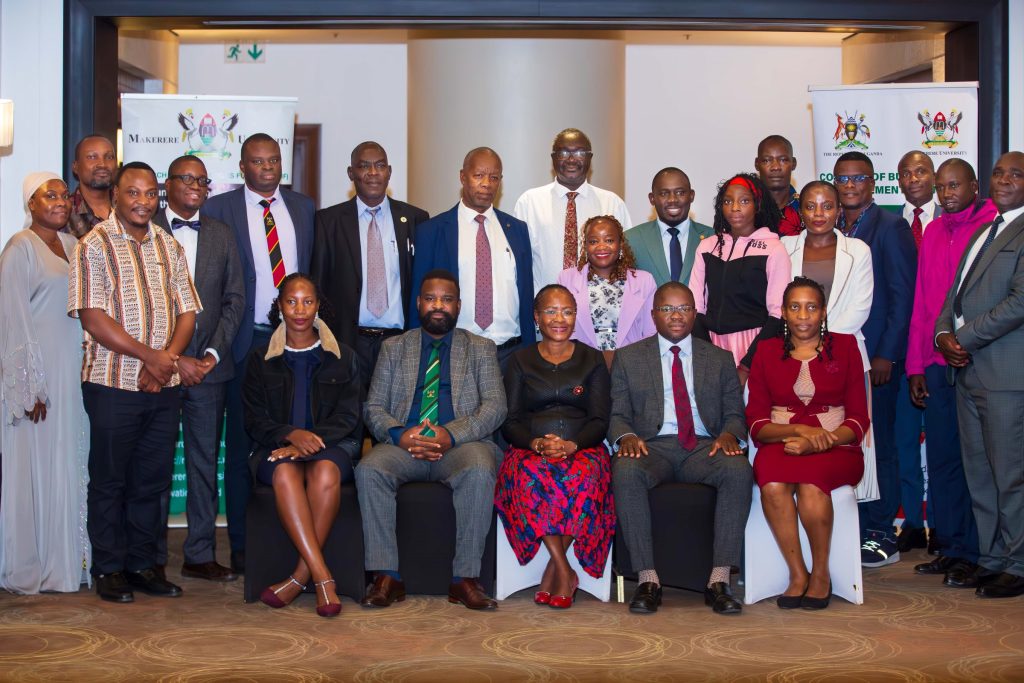
The Director of Research, Innovation, and Partnerships, Prof. Robert Wamala, said the dissemination workshop reflects Makerere University’s long-standing commitment to generating knowledge that responds to national priorities, advances innovation, and contributes to Uganda’s socio-economic transformation.
He added that the Directorate supports initiatives that move research beyond academic boundaries into practical application, policy influence, enterprise development, and community impact.
Dr. Peter Babyenda, the project’s Co-Principal Investigator, said the initiative combined research, outreach, and capacity-building activities, drawing lessons from global models where universities play a direct role in community development by supporting agriculture, industry, and the growth of Small and Medium Enterprises (SMEs) and Micro, Small, and Medium Enterprises (MSMEs).
Dean of the School of Economics, Prof. Ibrahim Michael Okumu, observed that while Uganda’s universities have produced substantial research, its translation into practical outcomes has remained slow. He cautioned that Makerere University’s relevance will ultimately be measured by the extent to which its work contributes to national development.
Dr. Babyenda noted that the platform will support the development of sustainable research, education, and outreach systems, helping to bridge the gap between university research and real-world application.
“As we launch this platform, I encourage academics, students, industry players, policymakers, and communities to actively engage with it,” Prof. Wamala said. “Let it serve as a living space for dialogue, learning, co-creation, and innovation.”
The knowledge-sharing platform is accessible to the public at www.dissemination.ug. Its launch took place at Sheraton Hotel in Kampala and was attended by officials from Makerere University, Kyambogo University, Gulu University, Mbarara University of Science and Technology (MUST), Busitema University, and Soroti University.
Trending
-

 Humanities & Social Sciences1 week ago
Humanities & Social Sciences1 week agoMeet Najjuka Whitney, The Girl Who Missed Law and Found Her Voice
-

 General1 week ago
General1 week ago76th Graduation Highlights
-

 Health2 weeks ago
Health2 weeks agoUganda has until 2030 to end Open Defecation as Ntaro’s PhD Examines Kabale’s Progress
-

 Agriculture & Environment2 weeks ago
Agriculture & Environment2 weeks agoUganda Martyrs Namugongo Students Turn Organic Waste into Soap in an Innovative School Project on Sustainable Waste Management
-

 General2 weeks ago
General2 weeks agoMastercard Foundation Scholars embrace and honour their rich cultural diversity
